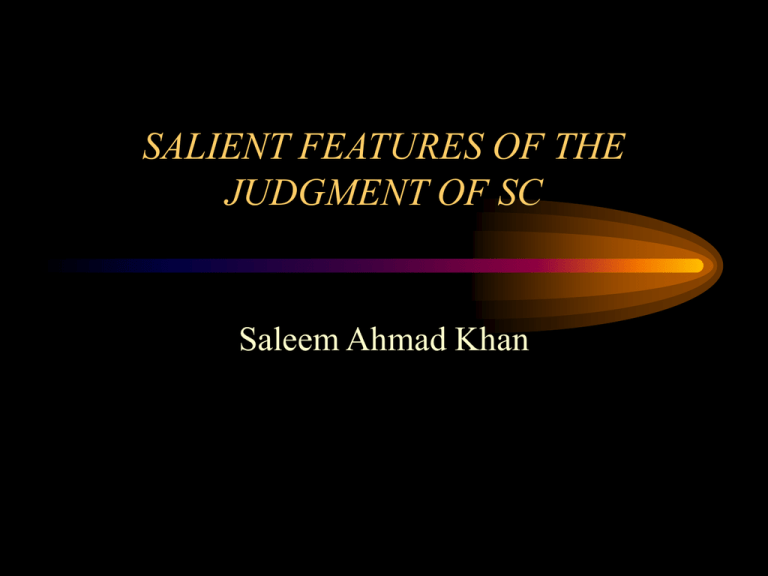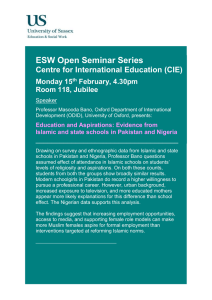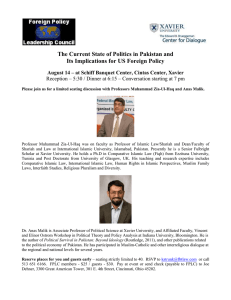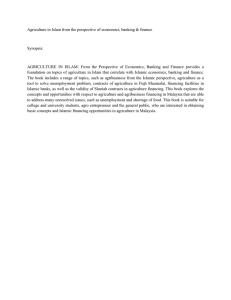SALIENT FEATURES OF THE JUDGMENT OF SC Saleem Ahmad Khan
advertisement

SALIENT FEATURES OF THE JUDGMENT OF SC Saleem Ahmad Khan Those who take riba (usury or interest) will not stand but as stands the one whom the demon has driven crazy by his touch. That is because they have said: Trading is but like riba. So, whoever receives an advice from his Lord and stops, he is allowed what has passed, and his matter is upto Allah. And the ones who revert back, those are the people of Fire. There they remain forever. Allah destroys riba and nourishes charities. And Allah does not like any sinful disbeliever. • This Judgment has disposed of the appeals against the Federal Shariah Court’s judgment dated 14/1/91. • In the favor of these appeals, some arguments were advanced. Core issues raised in the appeals were as: Argument 1. Riba has not been clearly defined by the Holy Qur’an and Sunnah, it comes under the definition of Mutashabihat Ans. It does not come under the Mutashabihat, it has been defined very clearly. Argument 2. Commercial interest does not fall under the definition of Riba, because: a: Commercial Interest is charged from wealthy persons whereas usury is charged from the poor. It does not exploit the poor while consumption interest or usury exploit the poor. Ans. Validity of a transaction is not based on the financial status of a party, like sale, leasing etc. Law does not differentiate between poor and wealthy in crimes like bribery, theft etc. Further, Commercial Interest also exploit the poor. b: It was not in the prevalent modern shape in those days. Ans. When some thing is prohibited, it is not directed to a particular form of it but it covers every form which comes in its general sense, e.g. gambling and pork, liquor and adultery are as Haram now as they were in Jahiliyyah c: The Commercial interest was not in vogue in Arab Ans. History shows that it was in vogue. d: Doctrine of necessity and wisdom requires to allow it Ans. (i) It does not, it is not at all a necessity in Shariah. Even from economic point of view, the modern interest has brought more harm to the humanity than the premature forms of usury. (ii) The Principles of Shariah are binding, even though their wisdom is not visible in a particular transaction. They are based on Illat. Argument 3. What steps are required for the elimination of interest from this setup? Ans. Those are mentioned in Judgment, coming later on. • The Holy Prophet (PBUH) has termed the following transactions as ’”Riba”: A transaction of money for money of the same denomination where the Quantity on both sides is not equal, either in a spot transaction or in a transaction based on deferred payment. EXPERIENCED BANKERS •Dr Ahmad Muhammad Ali, President Islamic Development Bank, Jeddah •Mr. Adnan Al-Bahr, Chief Executive International Investor, Kuwait, •Mr. Iqbal Ahmad Khan, Chief Executive Islamic unit, Hong Kong Shanghai Banking Corporation (HSBC) London •Mr. Abdul Jabbar Khan, former President of National Bank of Pakistan, •Mr. Shahid Hasan Siddiqui and Mr. Maqbool Ahmad Khan. SOME OUTSTANDING ECONOMISTS •Dr Umar Chapra, Economic Adviser of Saudi Monetary Agency, •Dr Arshad Zaman, former Chief Economist, Ministry of Finance, Government of Pakistan. • Prof. Khurshid Ahmad, •Dr Nawab Naqvi •Sayyed Muhammad Husain, and •Dr Waqar Masood Khan INTEREST FREE BANKING The prohibition of Interest is not limited to Islam, but it is shared by Judaism and Christianity. • Some of the old testaments have rendered riba as haram (See Exodus 22:25, Leviticus 25:35-36, Deutronomy 23:20, Psalms 15:5, Proverbs 28:8, Nehemiah 5:7 and Ezakhiel 18:8,13,17 & 22:12). • Agibi Bank was established circa 700 B.C. in Babylonian and functioned exclusively on equity basis. ISLAMIC BANKING 42 countries have Islamic Banking Institutions – 27 Muslim countries including Kuwait, Dubai, Saudi Arabia, Iran Malaysia Brunei and Pakistan – 15 non-Muslim countries including USA, UK, Canada, Switzerland and Australia ISLAMIC BANKING • 8 foreign banks have Islamic windows . These are: – – – – – – – – Citibank ANZ ABN AMRO Goldman Sachs Kleinwort Benson(German) Hong Kong Shanghai bank Saudi American bank Saudi British Bank ISLAMIC BANKING • Number Of Islamic Institutions (as per Islamic Banking Institute London 1997) : 200 • Estimated Islamic Pool US$ 100billion • Growth rate 15% for the past 5 years as compared to a meagre $5 billion in 1985 ISLAMIC BANKING • • • • • • • Islamic Modes of Financing Musharaka Mudarabah Murabaha Ijarah Salam Istisna PREVIOUS ENDEAVORS TOWARDS INTEREST FREE BANKING The Court also considered the detailed reports of the Council of Islamic Ideology submitted in 1980, the report of the Commission for Islamization of Economy constituted in 1991, and the final report of the same commission, reconstituted in 1997 which was submitted in August 1997. The bench also pursued the report of the Prime Minister’s Committee on Self Reliance submitted to the government in April 1991. THE CONVENTIONAL MARK UP SYSTEM IS NOT PERMISSIBLE IN SHARIA’A AS DESCRIBED IN THE JUDGEMENT BECAUSE (i)It does not fulfill condition of a Morabaha (ii)Banks earn profits without bearing any risk (iii)Seller has to possess the commodity involved before it is delivered to the purchaser. (iv)The time of payment of consideration must be known. CHANGES IN EXISTING LAWS & REGULATIONS IN SUCH A •The Interest Act, 1839 •The Government Savings Bank Act, 1873 (Sec 10) •Negotiable Instruments Act, 1881 (Sec 79, 80, 114 and 117(c)) •The Land Acquisition Act, 1894 (Sec 28, 32, 33 and 34) •Code of Civil Procedure, 1908 (Sec 34(I) & 2, 34 A (I) & (2) and 34 B (I)(a)) CHANGES IN EXISTING LAWS & REGULATIONS •Co-operative Societies Act, 1925 (Sec 59 (2)(e), Rule 14 (1)(h), Rule 22 and Rule 41) •The Insurance Act, 1938 (Sec 3BB, 27(3), 29(8)(b), 47B, 81(2)(d)) •State Bank of Pakistan Act, 1956 (Sec 22(1) •The West Pakistan Money-Lenders Ordinance, 1960. •The West Pakistan Money-Lenders Rules, 1965. •The Punjab Money Lenders Ordinance, 1960. •The Sindh Money Lenders Ordinance, 1960. CHANGES IN EXISTING LAWS & REGULATIONS •The N.W.F.P. Money Lenders Ordinance, 1960. •The Balochistan Money Lenders Ordinance, 1960. •Banking Companies Ordinance, 1962. (Sec 9) •Agricultural Development Bank Rules, 1961. (Rule 17) •Banking Companies Rules, 1963 (Rule 9) •The Banks (Nationalization) Payment of Compensation Rules, 1974. (Rule 9) •Banking Companies (Recovery of Loans) Ordinance, 1979. (Sec 9) THE SUPREME COURT DIRECTIONS (1) The Federal Government to constitute in the State Bank of Pakistan a high level Commission to establish Shariah compatible system. (2) The Commission shall chalk out the strategy to evaluate, scrutinize and implement the reports of various commissions. (3) The Ministry of Law and Parliamentary Affairs shall form a task-force to: (a)Draft a new law for the prohibition of Riba (b) Review the existing financial and other laws (c) Draft new laws to give legal cover to the new financial instruments. THE SUPREME COURT DIRECTIONS (4) all the banks and financial institutions shall prepare their model agreements and documents for SBP’s approval (5) All the joint stock companies, mutual funds and the firms to subject themselves to independent rating by neutral rating agencies. (6) All the Banks and financial institutions shall, therefore, arrange for training programs and seminars (7) The Ministry of Finance shall through a task force of its experts to find out means to convert the domestic borrowing into project related financing THE SUPREME COURT DIRECTIONS (8) The domestic inter-government borrowings as well as the borrowings of the Federal Government from State Bank of Pakistan shall be designed on interest free basis. (9) Serious efforts shall be started by the Federal Government to relieve the nation from the burden of foreign debts (10) The following laws being repugnant to the Injunctions of Islam shall cease to have effect from 31st March, 2000:- • The Interest Act, 1839. •The West Pakistan Money-Lenders Ordinance, 1960. THE SUPREME COURT DIRECTIONS •The West Pakistan Money-Lenders Rules, 1965. •The Punjab Money Lenders Ordinance, 1960. •The Sindh Money Lenders Ordinance, 1960. •The N.W.F.P. Money Lenders Ordinance, 1960. •The Balochistan Money Lenders Ordinance, 1960. • Section 9 of Banking Companies Ordinance, 1962. (11) Other laws or the provisions of the laws to the extent that those have been declared to be repugnant to the Injunctions of Islam shall cease to have effect from 30th June, 2001. GUIDELINES FOR IMPLEMENTATION OF THE ORDER (1) Individual’s credit history (2) Industries’ Rating (3) Debt markets in Pakistan (4) Establishment of data collection firms (6) Training of Officers and Staff (7) Audit and Accounts SUMMARY OF MEASURES • Strict austerity expenditure. measures to curtail the Government • An Act to regulate the Federal Consolidated Fund and Public Account, provincial Consolidated Fund and public Account • Law with prudential measures ensuring transparency be enacted. • Establishment of Institution like Serious Fraud Office /banks SUMMARY OF MEASURES • Establishment of credit rating agencies in the public sector. • Establishment of evaluator for scrutiny of feasibility reports. • Establishment of special departments within the State Bank: – Shariah Board – A Board for arranging exchange of information – A board for providing technical assistance to the financial institutions Conclusion • The Judgment is so comprehensive that covers all important aspects • Determination to create awareness of Islamic banking and finance • Arrange the TTT programs Using the curriculum already developed by us in Al Meezan • Taking assistance from institutions like IBA, LUMS, Hamdard, CBM etc. in structuring and administering the training programs



